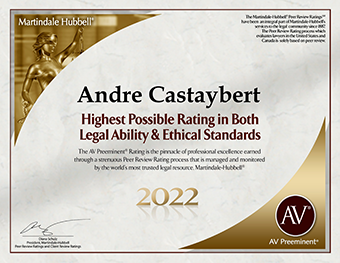July 6, 2022 — André Castaybert, principal attorney at Castaybert PLLC, has received a “Preeminent” AV rating in ethical standards and legal ability from the 2022 Martindale-Hubbell peer review. This is the highest possible honor that Martindale-Hubbell can bestow upon an attorney. This marks 9 consecutive years that André has received this award.
Jan. 1, 2021 — André Castaybert, principal attorney at Castaybert PLLC, has received a “Preeminent” AV rating in ethical standards and legal ability from the 2021 Martindale-Hubbell peer review. This is the highest possible honor that Martindale-Hubbell can bestow upon an attorney. This marks 8 consecutive years that André has received this award.
On January 3, 2018, the Second Circuit held that the “Wandering Dago” food truck (“WD”) was unconstitutionally excluded from a New York State lunch program because of its use of ethnic slurs. The opinion repeatedly cites to the 2017 case Matal v. Tam, in which the Supreme Court held that the USPTO’s prohibition of disparaging trademarks violated the First Amendment.
In Wandering Dago, Inc. v. Destito, the food truck featured the slur “Dago” in its name, and it also served sandwiches called “Goombah,” “Guido” and “Polack.” According to the owners of the truck, the slurs were used in a mocking way to “signal to . . . immigrant groups that this food truck is for them.” The New York State Office of General Services (OGS), however, found the slurs offensive and denied WD’s participation in New York’s “Summer Outdoor Lunch Program” on this basis.
WD brought a §1983 action against OGS, alleging that the denial amounted to a violation of the First and Fourteenth Amendments, as well as the New York State Constitution. The district court granted summary judgment in defendants’ favor, holding that constitutional protection did not apply to WD’s speech because it was either:
- government speech,
- private speech contracted by the government, or
- private speech in a government forum.
In its reversal, the Second Circuit held that OGS had engaged in viewpoint discrimination, because WD’s use of ethnic slurs reflected a viewpoint “about when and how such language should be used,” and the truck was denied access solely on account of this viewpoint. The unanimous panel disagreed with the district court on whether constitutional protection applied to WD’s speech, holding that:
- it was not government speech, as it was “implausible that OGS, by permitting WD’s full participation in the Lunch Program, would be viewed by the public as having adopted WD’s speech as its own,”
- WD, as a private entity seeking to pay for access to a forum for food trucks, was not contracted by OGS, and
- whether the private speech was conducted in a private or public forum was legally irrelevant.
Finally, the Court examined whether there was a compelling government interest behind OGS’s decision to deny WD’s application. The record did not support such a finding. The Second Circuit reversed the district court’s grant of summary judgment to OGS and awarded summary judgment to WD on its free speech, equal protection, and state law claims.
Should a personal injury plaintiff be compelled to give a court unlimited access to her Facebook account? According to the Appellate Division, First Department, the answer is no, but a dissenting opinion calls for a reevaluation of the Court’s decisions on this subject.
In Forman v. Henkin, 134 A.D.3d 529 (1st Dep’t 2015), the plaintiff alleged that she suffered injuries limiting her from doing various activities. She testified at her deposition that she used a Facebook account before the accident, but deactivated it after she started her lawsuit. The defendant moved for an order compelling the plaintiff to provide access to her Facebook account, including all photographs, status updates, and instant messages. The lower court ordered the plaintiff to produce all photographs of herself privately posted before the accident that she intended to use at trial, and all photographs taken after the accident that did not depict nudity or romantic encounters. She was also directed to include the number of words and characters in her private messages.
The Appellate Division modified the lower court order, finding that only photographs that the plaintiff intended to present to the jury at trial had to be disclosed. The defendant had not demonstrated his right to plaintiff’s nonpublic Facebook pictures or messages. The First Department and other Appellate Division Departments have required that a defendant requesting social media information must establish the relevancy of the requested disclosure before allowing discovery in this area. The plaintiff’s uploading of pictures or mere messages to other Facebook users did not meet this threshold of relevance.
The dissent recognized that the court’s prior recent decisions supported the majority opinion, but noted that the precedent relied upon is only a few years old. It recommended that the court reevaluate its precedent since social networking practices are still developing. The dissent was particularly concerned with the threshold requirement that the defendant could acquire nonpublic material shared on personal social networking sites if and only if he found something in the plaintiff’s public posts that contradicted her claims, which often requires judges to conduct an in-camera review to determine which posts are relevant. The in-camera review imposes a considerable burden on trial courts, which will only intensify as more and more people use social media sites. The dissent argued that a demand for social media posts, relevant to the issues raised in the case, would be consistent with the the traditional rules of discovery.







